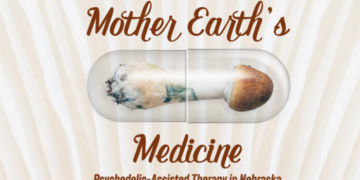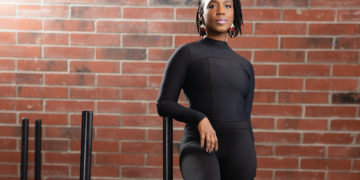You matter.
rPermanent words in permanent ink.r
Thousands of miles, and hundreds of microphones, and those three syllables have yet to fade for Kyler Erickson, the 26-year-old UNO graduate who has taken those indelible words and tattooed them on more than just his body.
He wears them on his shirt when he’s speaking in Gretna, Nebraska, or clambering on a bus during a 36-state tour. He lives them when he’s sitting in a booth calling basketball games for ESPN.
“I don’t think I was there by accident that day,” he said, while on his way back from his latest speaking gig in San Diego, California. “I think that we change the world through telling our stories.”
He’s talking about his own personal trauma; a bleak and terrifying fork that was suddenly jammed into his road, when all he was trying to do was ice down a sore ankle from the previous night’s basketball game at Millard South.
He was in the nurse’s office in January 2011 when he heard the sounds of a gun going off, one room away. One administrator was dead, one severely wounded. Shot by a student the now-bleeding administrators had recently disciplined.
On that day, he witnessed things that have hummed with a kind of dark reverberation in his mind since.
The star athlete suddenly found himself struggling. His grades dropped. His eyes weren’t locked onto the 90 feet of hardwood that had always felt like a second home.
“For about a year, I denied that I needed help,” Erickson said. “I was worried about the stigma.”
He was hospitalized twice, suffering from kidney stones, depression, and post-traumatic stress disorder.
“The PTSD wrecked me the most,” he said. “I was replaying the shooting in my head, every single night. I knew I needed help. I took the summer completely off from school and from basketball to get treatment.”
Erickson began undergoing Eye Movement Desensitization and Reprocessing treatment, a psychotherapy designed to reprogram past traumas with a series of lights, movement, and repetition.
It was rigorous. Tough. But it worked.
Somewhere along the way, his eyes locked onto the blinking lights, Erickson began to see his future.
“It was honestly the hardest four months of my life,” he said. “After the therapy, do I still think about the shooting? Yes. But I’m not crippled by it anymore. I don’t curl up into a ball. I don’t hide in the corner.”
As the sounds of his own horror began to fade, he filled the silence with another kind of noise: his own voice.
Vulnerable. Not without a tremble, on occasion, but there nonetheless. Speaking to friends and family. Speaking to teammates at the University of Nebraska at Omaha. He became arprofessional speaker.
As his message and confidence grew so, too, did the opportunities.
He began connecting with more and more people, including people at news stations and media companies, all of them relating in some capacity with his message of hope and fearless optimism until once again he found himself at a fork in the road.
ESPN reached out. They needed someone to fill in during a UNO home game.
“I had never done broadcasting before. I didn’t know the rules. I mainly didn’t want to say something dumb, to be honest,” he laughed.
Never one to let a diem go un-carpe’d, he leapt at the opportunity, and has been a contributor to the network ever since.
“Life is very hard and often times we need help to get through it,” Erickson said. “But, we’ve got one life. One chance to do this. If you get the help you need, it frees you up to go and chase your dreams.”
Two words.
One life.
Above all else, Kyler Erickson wants people to know: you matter.
r
Visit kylererickson.com for more information.
rThis article was printed in the October 2019 edition of B2B. To receive the magazine, click here to subscribe.












